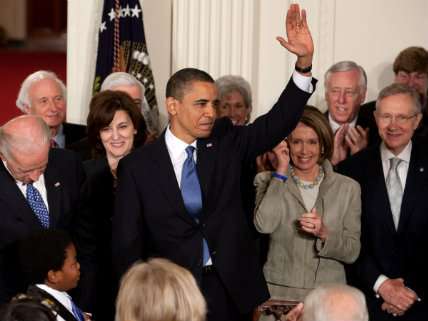Why the Obama Administration's Latest Gambit to Keep Health Insurance Rates Down Won't Work

Obamacare's regulations have helped drive up the cost of health insurance sold through the law's exchanges. Now the Obama administration is, predictably, pushing states regulators to keep health insurance premiums down.
Big rate hikes are looming all over. As The New York Times reported last month, health insurers "around the country are seeking rate increases of 20 to 40 percent or more, saying their new customers under the Affordable Care Act turned out to be sicker than expected."
The Times now reports that the Obama administration is "trying to persuade states to cut back big rate increases requested by many health insurance companies for 2016."
The political incentives are obvious: Significant premium hikes are likely to further erode support for the law going into the 2016 election season.
The administration is claiming some victory already, the Times reports, saying that premiums will come in lower than what insurers have requested in Tennessee, where BlueCross BlueShield put in for a 36 percent rate hike, and other states.
It's possible, of course, that state regulators in a handful of states will help out the administration by aggressively pushing back against insurance hikes. But there are clear limits to this strategy as a tool for keeping premiums in check.
For one thing, the administration doesn't have a whole lot of leverage with states, or great insight into local insurance market conditions. As the Times reports:
State officials said their agencies had been reviewing insurance rates for decades and generally knew local market conditions better than federal officials.
Monica J. Lindeen, a Democrat who is the Montana insurance commissioner and the president of the National Association of Insurance Commissioners, said the letter from Mr. Counihan was interesting, but "did not point to any new information that would impact how state insurance departments regulate their health insurance markets."
This is a polite way of saying that the administration doesn't have much of an argument. Instead, administration officials are just hoping that states will flex some regulatory muscle in order to bail the White House out of a potentially tough political situation.
Even if state regulators are willing to take action, however, there's only so far they can go. Insurers cannot be forced to operate unprofitably for very long. And insurers are already warning about the potential consequences of rate increases that have been lowered by regulators.
New York regulators reduced average rate increases in the state from 10.4 percent to 7.1 percent. But the industry group representing New York's insurers says the reduced rates don't reflect the underlying economic reality.
"The approved rates do not, in many cases, accurately reflect the financial status of plans as indicated in their rate submissions," said Paul F. Macielak, president of the New York association. "Health plans have suffered financial losses the last two years when the state significantly reduced premium requests. Plans cannot be expected to continue losing money year after year and remain viable."
This may be at least partially insurance industry bluster, designed to help better position New York's insurers in future negotiations with regulators. But it's not a completely bogus notion. There's little question at this point that enrollees in exchange plans across the country have turned out to be markedly sicker and more expensive to insure than expected, and that health insurers have lost money, in some cases quite a bit of money, as a result. (The New York Times reported a number of these losses last month.)
These plans can't keep operating at a loss forever. Eventually they'll pull their plans from the exchanges. As the Times notes, nonprofit plans in Iowa and Louisiana will likely be shuttered by the end of the year. And in Oregon—not exactly a bastion of conservative, anti-Obamacare sentiment—the state's insurance commissioner actually directed some health insurers to raise rates for next year by significantly more than requested—warning that "inadequate rates could result in companies going out of business in the middle of the plan year, or being unable to pay claims." The administration may ultimately find some success stories. But for the most part, state regulators shouldn't be expected to fix the White House's Obamacare premiums problem.


Show Comments (119)